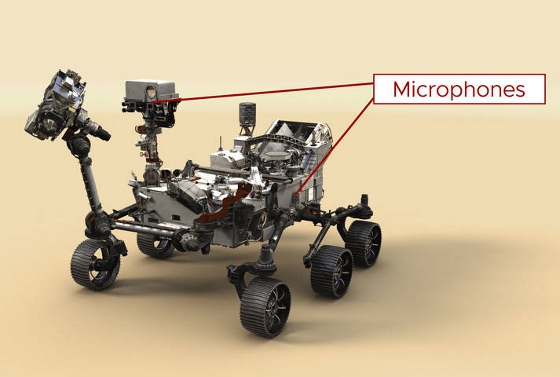 |
| April 05, 2022 | Volume 18 Issue 13 |
Designfax weekly eMagazine
Archives
Partners
Manufacturing Center
Product Spotlight
Modern Applications News
Metalworking Ideas For
Today's Job Shops
Tooling and Production
Strategies for large
metalworking plants
Weird Science: Speed of sound on Mars is slower than on Earth and varies with pitch

This illustration indicates the placement of Perseverance's two microphones. The microphone on the mast is part of the SuperCam science instrument. The microphone on the side of the rover was intended to capture the sounds of entry, descent, and landing for public engagement. [Credits: NASA/JPL-Caltech]
For 50 years, interplanetary probes have returned thousands of striking images of the surface of Mars, but never a single sound. Now, NASA's Perseverance mission has put an end to this deafening silence by recording the first-ever Martian sounds. The scientific team for the French-US SuperCam instrument installed on Perseverance was convinced that the study of the soundscape of Mars could advance our understanding of the planet. This scientific challenge led them to design a microphone dedicated to the exploration of Mars.
Perseverance first recorded sounds from the Red Planet on February 19, 2021, the day after its arrival. These sounds fall within the human audible spectrum, between 20 Hz and 20 kHz. First of all, they reveal that Mars is quiet, in fact so quiet that on several occasions the scientists thought the microphone was no longer working. It is obvious that, apart from the wind, natural sound sources are rare.
In addition to this investigation, the scientists focused on the sounds generated by the rover itself, including the shock waves produced by the impact of the SuperCam laser on rocks, and flights by the Ingenuity helicopter. By studying the propagation on Mars of these sounds, whose behavior is very well well understood on Earth, they were able to accurately characterize the acoustic properties of the Martian atmosphere.
The researchers show that the speed of sound is slower on Mars than on Earth. However, the most surprising thing is that there are actually two speeds of sound on Mars -- one for high-pitched sounds and one for low frequencies. On Earth, sounds typically travel at 767 mph (343 m/s). But on Mars, low-pitched sounds travel at about 537 mph (240 m/s), while higher-pitched sounds move at 559 mph (250 m/s).
Sound attenuation is greater on Mars than on Earth, especially for high frequencies, which, unlike low frequencies, are attenuated very quickly, even at short distances. All these various factors would make it difficult for two people standing only 5 m apart to have a conversation on the Red Planet. They are due to the composition of the Martian atmosphere (96% CO2, compared to 0.04% on Earth) and the very low atmospheric surface pressure (170 times lower than on Earth).
According to NASA, "Another effect of this thin atmosphere: Sounds carry only a short distance, and higher-pitched tones carry hardly at all. On Earth, sound might drop off after about 213 ft (65 m); on Mars, it falters at just 26 ft (8 m), with high-pitched sounds being lost completely at that distance."
After one year of the mission, a total of five hours of recordings of the acoustic environment have been obtained. In-depth analysis of these sounds has made the sound generated by the turbulence of the Martian atmosphere perceptible. The study of this turbulence should enhance our knowledge of the interaction of the atmosphere with the surface of Mars. In the future, the use of other robots equipped with microphones could help us to better understand planetary atmospheres.
Sources: The National Center for Scientific Research (CNRS, France), NASA
Published April 2022
Rate this article
View our terms of use and privacy policy
